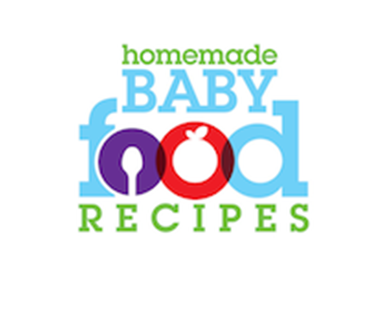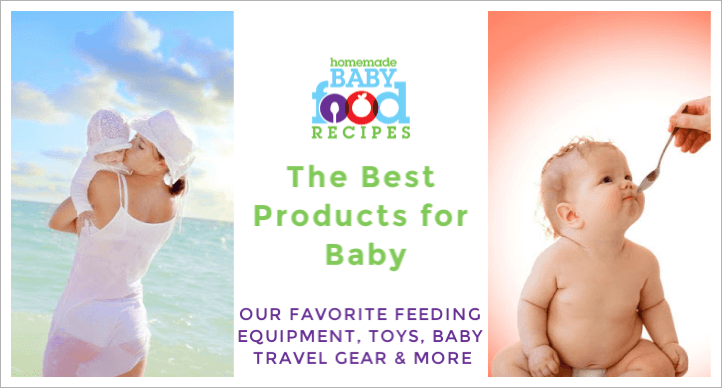6 To 9 Month Baby Foods
Updated: July 12, 2023
It’s time to get creative! Your 6 to 9 month baby will be eager to try new foods now, and may even start to chew.
Learn how to create meals that will please his tiny palate!
Which foods should I introduce to my 6 to 9 month baby?
There are no hard and fast rules here.
All babies are different, with their own unique likes and dislikes. Just like you and me!
The information and recipes in this section are meant as a guide. If your baby doesn’t seem to want to try all of these foods just yet, then don’t worry.
Give it a week or two, then try again.
His tastebuds are developing all the time – the meal he adamantly refuses today may be his absolute favourite food next week!
NOTE: When introducing any new foods to your 6 to 9 month baby, remember to apply the four day rule.
And ALWAYS check with your doctor before giving any new foods to your baby.
Fruits and vegetables
Once your baby is enjoying pureed fruits and vegetables, (see baby’s first foods recipes), it’s time to incorporate a few new flavours and textures.
By 6 months, your baby can enjoy most fruits and veggies, although some can cause more digestive discomfort than others.
Please go to our main menu (at the top of the page, or using the ‘menu’ button on mobile) and see our comprehensive list of fruits and vegetables.
We offer you an in-depth look at each one, with tips on introducing them and yummy recipe ideas.
If you find your baby LOVES fruit but is less keen on vegetables…
Help! My baby won’t eat vegetables
Peeling fruits and vegetables…
You may have been told that you should peel fruits and veggies for baby food – but is it always necessary?
Find out more about the pros and cons of peeling produce for your baby, plus tips for minimizing the risk to your baby from pesticide residues:
Should I Peel Fruits and Vegetables For My Baby?
To cook or not to cook…
Most baby food recipes suggest cooking fruits and vegetables – but is it OK to give them to your baby raw?
Learn more about whether cooking fruits or vegetables for baby is always necessary
Is fresh ALWAYS best?
Find out more about using frozen or canned veggies and fruits in your baby food recipes.
Meats
Meat is a good source of protein, but at this stage most babies get protein from their milk.
The main benefit of introducing meat is for the extra iron that it provides.
This is because babies’ stores of iron may begin to deplete between 6-9 months of age.
Iron is an essential part of the blood stream, carrying oxygen to tissues to provide the energy needed for growth.
Read more about how and when to introduce meat to baby
Chicken or turkey is the best meat to introduce at first – learn more about introducing chicken… and try these chicken baby food recipes at around 7-8 months.
Avoid processed meats like ham or hot dogs. They can be salty and lack the nutritional value your baby needs.
Once your 6 to 9 month baby is enjoying chicken or turkey, then try introducing pork, beef or lamb.
Try these delicious and healthy meat recipes – tasty treats for baby!
Iron supplements for infants – are they necessary?
Tofu
Nutritious and versatile, tofu is a perfect addition to your homemade baby food.
You can introduce it from around 8 months of age.
Visit the tofu information and recipes page to learn more about this amazing food.
Fish
High in protein, potassium and vitamins, fish is the perfect “health food” for babies.
It also contains Omega 3 fatty acids, which lower cholesterol and prevent high blood pressure.
(Of course, you don’t need to be worrying about that just yet. But remember, the healthy eating habits you establish now will last a lifetime!)
Try these fish recipes when your baby is around 7 months old.
You can even increase the quantities and cook these healthy dishes for the whole family.
Yogurt
This is typically safe from 6 months of age.
Try to stick to natural, unsweetened yogurt (here’s a recipe to make your own) and add some fruit to tempt your baby.
Don’t sweeten yogurt with honey – it is very dangerous to give honey to babies under one year of age (see baby foods to avoid).
Click here for more information about introducing dairy products to your 6 to 9 month baby and discover why babies need whole milk dairy products and fats.
Milk allergy and lactose intolerance
Cheese

You can safely introduce cheese to your 6 to 9 month baby, but sometimes our children found strong cheeses (like Cheddar), a little too powerful in taste.
Cottage cheese is a good alternative and you will come across it in many of the recipes on this site.
Learn more about giving your little one cheese – and discover the safest cheeses for baby and those you should avoid… When Can My Baby Eat Cheese?
OR
Eggs
It is usually safe to introduce mashed egg yolks to your 6 to 9 month baby, but speak to your child’s doctor before introducing whole eggs.
This is because egg whites are highly allergenic.
See our egg allergy information page for more information.
Mashed egg yolk actually makes a great thickener for over-runny purees.
And there is some evidence that eating egg yolks contributes to the development of your baby’s brain.
So add a little to your baby’s meals here and there for an extra, nutritional boost!
Find out more and try our egg-cellent recipes!
Legumes

These are foods such as beans, peas and lentils.
High in protein, vitamins and minerals, they make a great addition to baby’s diet.
But beware!
Legumes can cause gas (or wind), so take care not to overfeed your baby from this food group.
For some tasty 6 to 9 month baby recipes using legumes, take a look at our lentil baby food ideas and vegetarian baby food recipes
Other foods
- How to make your own rice cereal
- How to make your own baby oatmeal
- How to make your own barley cereal
- Introducing peanuts (NEW recommendations)
- Introducing wheat and gluten
- Wheat alternatives for babies with wheat allergy/gluten intolerance
- Using flax in your baby food recipes
- Giving baby sesame foods, such as hummus and halva
- Giving babies spicy food or onions
- Feeding a baby with a cold
Should I Puree Or Mash The Food For My 6 to 9 Month Baby?
At around 7-8 months, your baby may have a tooth or two.
This varies a great deal, though, from child to child.
Some get their teeth earlier, while others remain delightfully gummy through most of their first year.
Once teeth appear, your baby should be able to handle soft lumps.
You can then try mashing food instead of pureeing it.
But since some babies seem to manage quite well by mashing food with their gums alone, it is not absolutely necessary to wait for teeth.
We introduced lumpier food to our babies when they were around 7 months old.
Three had teeth, one didn’t, but they all seemed to cope well.
Just remember to watch your baby carefully when you change the texture of his food.
As he becomes accustomed to small, soft lumps, then go from mashing to finely chopping the food.
You know what’s best for your baby, so take things at his pace.
But do try to encourage chewing and don’t stick to pureed foods for too long.
Our youngest child was incredibly lazy when it came to chewing!
It was very tempting to stick with pureed food, knowing she’d eat it rather than spit out every tiny lump.
But we persisted, and eventually she got the hang of it.
So be patient, and keep trying!
Read more about…
How Many Times A Day Should I Give Solid Food To My 6 To 9 Month Baby?

At 6 months, this may only be once or twice a day.
Many parents find that, by 9 months, their babies have settled into a pattern of having 3 meals a day.
But all babies are different and this may not suit your child.
So let him guide you – you’ll be able to tell when it’s time to increase his intake of solid foods.
How much should my baby be eating?
Remember, though, that milk is a very important part of your 6 to 9 month baby’s diet. Don't aim to replace it with solid food at this stage.
Try giving your baby half his milk before his solid food and half afterwards.
Towards the end of his first year, you may find that your baby begins to refuse the second half of his milk.
This is the time to think about dropping a feed or two.
When Should I Introduce A Cup To My 6 To 9 Month Baby?

Try introducing a “sippy” cup at about 7 months.
We found it hard to find the perfect cup at this age. The spill-proof varieties seemed to require quite vigorous sucking and I think our babies were just too lazy to oblige!
We ended up using a free-flowing spouted cup.
Our baby could drink more easily, but babies have a tendency to shake things up and down – hence we all had a shower every mealtime.
Whichever type you choose, our advice is to STICK TO WATER as a main drink for as long as you can.
If a baby has never had juice, then he won’t know what he’s missing and he’ll be perfectly satisfied with good old water!
Once he’s tried juice, he’ll never look at water in the same way again.
And that’s a shame – the benefits of plenty of water are well known to us all!
When should I give my baby water?
If you really want to give your baby juice, then ONLY give it in a cup, never a bottle.
Dentists agree that the sugar in the juice does more harm when the teeth are “bathed” in juice from a bottle.
More information about introducing fruit juice to your baby
Have fun trying out these 6 to 9 month baby recipes on YOUR little one.
There’s nothing quite like a fresh and tasty meal made by Mum.
More baby food tips and information…
Introducing solids to your breastfed baby


